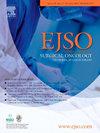Prevalence of sarcopenic obesity in patients with gastric cancer and effects on adverse outcomes: A meta-analysis and systematic review
IF 3.5
2区 医学
Q2 ONCOLOGY
引用次数: 0
Abstract
Purpose
To assess the prevalence of sarcopenic obesity in patients with gastric cancer and its impact on adverse outcomes.
Methods
A computerized search of PubMed, Embase, Cochrane Library, Web of Science, and CINAHL databases was performed to search for articles related to sarcopenic obesity in patients with gastric cancer. The search was conducted until June 16, 2024, from the date of the creation of the database.
Results
A total of sixteen studies were included, including fifteen cohort studies and one cross-sectional study involving 4087 patients. The results of the meta-analysis showed that the prevalence of sarcopenic obesity in gastric cancer patients was 16.3 % (95 % CI: 12.2 %–20.4 %). Sarcopenic obesity significantly shortened the overall survival of gastric cancer patients (HR = 1.64, 95 % CI: 1.20 to 2.25, P = 0.002) and increased the risk of postoperative significant complications (OR = 2.84, 95 % CI: 1.95 to 4.16, P < 0.001), severe complications (OR = 2.60, 95 % CI: 1.45 to 4.64, P = 0.001), surgical site infection (OR = 3.82, 95 % CI: 1.47 to 9.89, P = 0.006), and mortality (OR = 4.84, 95 % CI: 1.38 to 17.02, P = 0.014), but no significant effect on 30-day readmission (OR = 1.90, 95 % CI: 0.31 to 11.84, P = 0.491).
Conclusions
The prevalence of sarcopenic obesity is high in patients with gastric cancer and is strongly associated with poor postoperative outcomes. Healthcare providers should evaluate patients with gastric cancer for sarcopenic obesity early to prevent or reduce the incidence of adverse outcomes.
胃癌患者肌肉松弛性肥胖的患病率及其对不良预后的影响:荟萃分析和系统综述。
目的:评估胃癌患者肌肉松弛性肥胖的发生率及其对不良预后的影响:对 PubMed、Embase、Cochrane Library、Web of Science 和 CINAHL 数据库进行计算机检索,搜索与胃癌患者肌松性肥胖相关的文章。检索时间从数据库创建之日起至2024年6月16日:共纳入 16 项研究,包括 15 项队列研究和 1 项横断面研究,涉及 4087 名患者。荟萃分析结果显示,胃癌患者肌肉疏松性肥胖的发生率为 16.3%(95 % CI:12.2%-20.4%)。肌肉疏松性肥胖明显缩短了胃癌患者的总生存期(HR = 1.64,95 % CI:1.20 至 2.25,P = 0.002),并增加了术后重大并发症的风险(OR = 2.84,95 % CI:1.95 至 4.16,P 结论:胃癌患者中肌肉松弛性肥胖的发生率很高,且与术后不良预后密切相关。医疗服务提供者应及早评估胃癌患者是否存在肌肉松弛性肥胖,以预防或减少不良后果的发生。
本文章由计算机程序翻译,如有差异,请以英文原文为准。
求助全文
约1分钟内获得全文
求助全文
来源期刊

Ejso
医学-外科
CiteScore
6.40
自引率
2.60%
发文量
1148
审稿时长
41 days
期刊介绍:
JSO - European Journal of Surgical Oncology ("the Journal of Cancer Surgery") is the Official Journal of the European Society of Surgical Oncology and BASO ~ the Association for Cancer Surgery.
The EJSO aims to advance surgical oncology research and practice through the publication of original research articles, review articles, editorials, debates and correspondence.
 求助内容:
求助内容: 应助结果提醒方式:
应助结果提醒方式:


